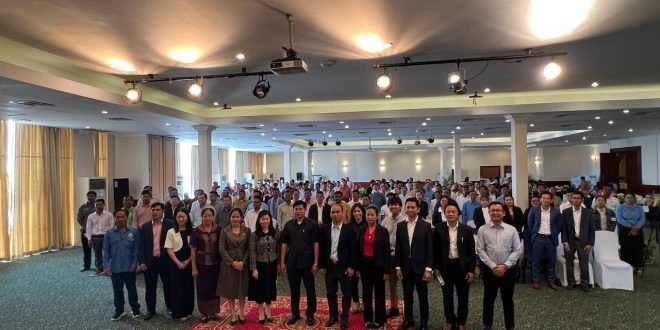The Agricultural Cooperative Support Working Group (AC-WG) is a collaborative platform established to strengthen coordination and partnerships among CamboDHRRA members. This includes NGOs supporting Agricultural Cooperatives (ACs), farmer organizations, government institutions, private sector actors, and donor agencies. The primary mission of the AC-WG is to address the diverse challenges faced by Agricultural Cooperatives, such as limited market access, insufficient financial resources, weak governance structures, and gaps in organizational capacity.
Specific Objectives of AC-WG:
• Facilitate the exchange of successful management strategies and business operations among Agricultural Cooperatives, fostering opportunities to learn from both local and international experiences.
• Identify critical knowledge gaps and prioritize research to inform the design of more effective and impactful interventions for agricultural cooperative development.
• Build stronger connections by linking Agricultural Cooperatives with key stakeholders, including government bodies, private sector actors, financial institutions (e.g., banks and MFIs), donor agencies, and development partners, to mobilize support and resources.
• Strengthen the capacities of Agricultural Cooperatives to function more efficiently and better meet the needs of their members, ensuring greater sustainability and impact.
Key Activities:
To achieve its objectives, the AC-WG will carry out the following activities:
• Quarterly Meetings: Organize regular meetings to discuss challenges, share updates, and strategize on collective actions to address issues faced by Agricultural Cooperatives.
• Surveys on Cooperative Challenges: Conduct surveys to identify the most pressing challenges that Agricultural Cooperatives face, which may include access to finance, market issues, governance concerns, and other operational difficulties.
• Learning Exchange Programs: Facilitate learning exchanges where cooperatives can share experiences and solutions regarding agricultural cooperative management, value chain development, and business operations.
• National Cooperative Business Forum: Host a National Cooperative Business Forum to provide a platform for discussion among government officials, the private sector, donor agencies, and cooperative members. The forum will address key issues, share best practices, and drive action toward cooperative development.
• Engagement in Law and Policy Consultations: Participate in consultations regarding the drafting of laws and regulations impacting the agricultural cooperative sector. Advocate for responses from the public sector/government that are favorable to the growth of cooperatives.
• Promote Producer Public-Private Partnerships (PPPP/4P): Support and promote public-private partnerships as part of cooperative business strengthening and market linkages. These partnerships will create more sustainable and effective market access for agricultural cooperatives.

 Cambodhrra Cambodian Partnership for Development Human Resource in Rural Area Association
Cambodhrra Cambodian Partnership for Development Human Resource in Rural Area Association